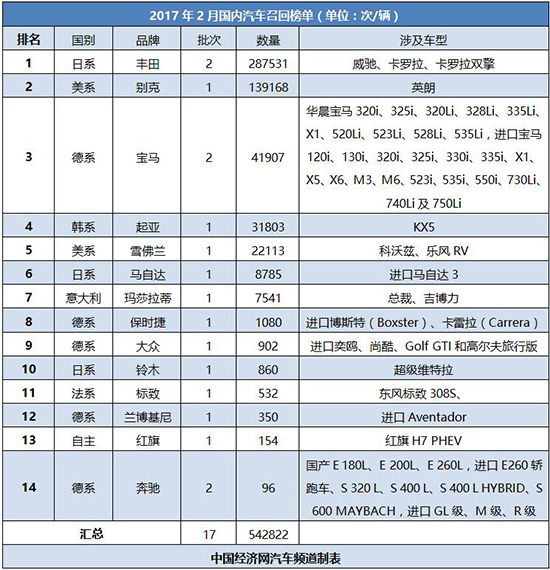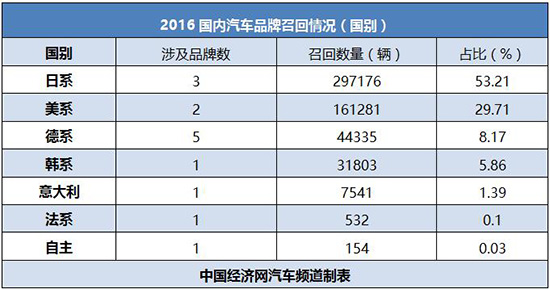According to the recall in February, three brands of Japanese cars issued recall notices, recalling 297,176 vehicles, accounting for 53.21% of the total recalls; two brands of American cars announced the recall plan, recalling a total of 161,281 vehicles. The proportion was 29.71%; the German brand had a total of 44,335 vehicles recalled, accounting for 8.17%; the Korean brand recalled 31,803 vehicles, accounting for 5.86%. Compared with foreign brands such as Japanese and American, the amount and frequency of domestic independent brand recalls are relatively small. In February, only the Hongqi brand recalled 154 red flag H7 PHEVs due to the risk of leakage of fuel from the engine fuel injection pump. According to the recall issued by the General Administration of Quality Supervision, Inspection and Quarantine last month, the China Economic Net's car channel has been statistically and organized to form the “February Domestic Automobile Recall Listâ€. In February, a total of 14 automobile brands in the Chinese auto market issued 17 recall notices, recalling 542,822 vehicles.   According to Cui Dongshu, deputy secretary-general of the National Federation of the Federation, this is mainly related to the maturity of China's automobile quality recall system. It is understood that in 2004, China began to implement the recall system for defective automobile products, which has been 13 years since. As of December 25, 2016, the cumulative number of defective vehicle recalls was 1,295, involving 36.68 million vehicles. Since the promulgation and implementation of the 2013 Regulations on the Management of Defective Automobile Product Recalls, the number of vehicle recalls has exceeded 5 million for three consecutive years, 2016. It broke through 10 million vehicles for the first time, reaching 11.1315 million units, a record high. However, Cui Dongshu also bluntly said that the car recalled in February was such a large-scale recall that the car was not a small relationship with "3·15"; "avoid being "exposed" during the March 15th period, and some car companies chose to take the initiative to recall." Judging from the recall in February, three brands of Japanese cars issued recall notices, recalling 297,176 vehicles, accounting for 53.21% of the total recall; two brands of American cars announced the recall plan, recalling 161,281 vehicles The proportion accounted for 29.71%; the German brand had a total of 44,335 vehicles recalled, accounting for 8.17%; the Korean brand recalled 31,803 vehicles, accounting for 5.86%.   Among them, the Japanese brand Toyota ranked first in the number of recalls, accounting for 53% of the total in February. From the reasons for the recall issued by Toyota, it is mainly due to the problem of the engine compartment cover, that is, "the parts of the engine compartment cover locking mechanism are improperly fitted, and the gap between the cover latch and the cover lock is generated. The vibration of the vehicle may cause the cover. The bolt solder joints are unsoldered and produce abnormal noise; if the engine compartment cover is opened and closed in this state, the latch may not be locked, and there is a risk of opening the engine compartment cover during driving, which poses a safety hazard." In this regard, Xue Xu, an associate professor and strategic management and marketing management expert at Peking University School of Economics, believes that Japanese companies have often had problems in quality and quality in recent years, reflecting some of the inherent problems inherent in Japanese companies. The aging population and the relative reduction in the number of excellent employees and high-quality talents willing to engage in manufacturing have led to a weakening of the management culture of Japanese companies, which has caused problems in quality control and management. In addition, the US brand Buick and Chevrolet (same as SAIC-GM) all recalled Yinglang, Kovaz, Lefeng RV and other models due to the hidden danger of the clutch master Cylinder, a total of 161,281 vehicles. Compared with foreign brands such as Japanese and American, the amount and frequency of domestic independent brand recalls are relatively small. In February, only the Hongqi brand recalled 154 red flag H7 PHEVs due to the risk of leakage of fuel from the engine fuel injection pump. According to the recall announcement, the car has not yet been officially sold to the public. Cui Dongshu believes that the total number of recalls of self-owned brand car companies is small, mainly because in recent years, independent brands pay more attention to improving their production quality management and control system, which makes the product quality improve and the problem defects gradually decline. Our company was set up in 2002.We are using the advanced cold punch technology to produce spark plug which is similar to NGK and Champion technology.With such technology, the metal shell and ceramic are better protected the quality of the spark plug are more stable to get avoid from air leaking and broken.Our spark plug products are ranged into more than 100 models with an anual out put of 6 million pcs. Besides the advanced technology,we also have a strong advantage of automatical production.Most of our production device is automatical that we have very high,efficiency and stable quality.Throughout such years of developing,we have gained a good reputation at domestic motorcycle manufacturer.Furthermore,our products have been exported to South East Asia, Middle East, Australia and so on. Revolution,refine and devotion are our principal of working.Welcome to visit us and raise your demand and your comments request are our target to strive. Spark Plug A7Tc,Changing Spark Plugs,Automotive Spark Plugs,Auto Normal Spark Plug LIXIN INDUSTRIAL & TRADE CO.,Limited , https://www.jmsparkplugs.com
